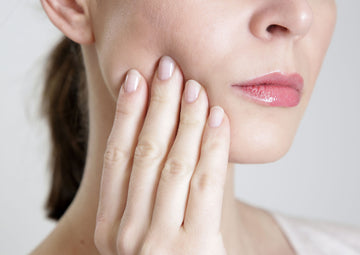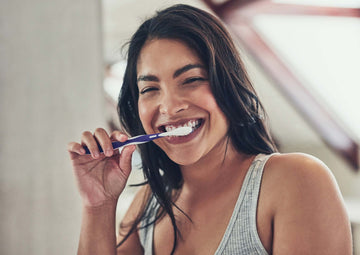

You might be asking, “I have sensitive teeth -- can I whiten them?” The short answer is yes. But the follow-up question is how.
The first step is to speak with your dentist about whitening your teeth. They can let you know if whitening is possible for you specifically, what options are best for your teeth, and why you may have sensitive teeth.
How To Help Sensitive Teeth Before Whitening?
You may be wondering what you can do to prepare for whitening your sensitive teeth. The first thing you can do (after talking to your dentist) is to brush your teeth with a desensitizing toothpaste for the two weeks leading up to the whitening session. There are also desensitizing gels and pastes that you can rub directly onto your teeth.
You also can’t forget about your gums -- you’ll need to prepare them for the whitening as well. You can layer some vitamin E oil on your gums to help avoid irritation. You can put a drop on your finger, gently rub it on your gums, and then repeat until you’ve covered all of your gums.
You can also take an anti-inflammatory medicine, like acetaminophen or ibuprofen, about 30 minutes before you do the session.
How To Whiten Sensitive Teeth?
Once you’re ready to whiten your chompers, there are two main ways you can do this: allow a professional to whiten them, or get an at-home whitening kit
Professional Teeth Whitening
As we mentioned earlier, your dentist should be very involved in this whole process, from preparing you to recommending how to whiten your teeth to ongoing care.
The American Dental Association suggests choosing a whitening product only after you’ve talked to your dentist.
The dentist will first examine your mouth to get a better idea of what whitening product to recommend. They may suggest an in-office professional whitening, or they may give you a couple ideas for whitening toothpastes or at-home kits.
If you have the dentist whiten your teeth, they’ll use whitening gels or pastes and will often use an LED light to speed up the process. A professional whitening can cost between $600-700, depending on where you live.
At-Home Teeth Whitening
If you’ve got sensitive teeth, that means the dentin of your teeth (the layer below the enamel) is exposed. So using a typical whitening agent -- like carbamide peroxide or hydrogen peroxide -- might be a bit harsh.
You can still use these products, but your dentist may recommend using less of them or using them less frequently.
If your dentist sends you home with their custom trays, it may be effective, but it’s going to cost about $400. However, if they give you recommendations for an at-home whitening kit or whitening strips that you can buy yourself, you’ll spend less than $100 and get a high-quality product.
Although when you whiten at home and you have sensitive teeth, go easy on the whitening gel. Just put a thin layer on your teeth and try to avoid excess gel from getting on your gums.
Best Teeth Whitening For Sensitive Teeth
When it comes to at-home whitening kits, most of them are not tailored to people with sensitive teeth. Most of them are for the stereotypical consumer -- those with teeth and gums that have little to no sensitivity.
But lots of people have sensitive teeth. That’s why we’ve created an at-home teeth whitening kit for sensitive teeth.
People who use our products and follow the instructions rarely experience discomfort or tooth sensitivity. Mostly, they just experience the best results possible.
However, on the rare occasion that sensitivity may happen, you should wait 24 hours before using the kit again. Then simply use less gel next time and that should help. Sensitivity, after all, it temporary and not an emergency situation.
It’s one of our goals to seek to provide affordable teeth whitening that doesn’t cause sensitivity. You can check out AuraGlow whitening kits on our online store.
How To Get Rid Of Sensitive Teeth After Whitening?
Now you might be wondering how to help sensitive teeth after whitening. Well, there are certain things you should do after whitening your teeth, regardless of whether you got it professionally done or did it at home.
First, you should avoid consuming very hot or very cold foods and drinks, especially if your teeth are sensitive. Also, acidic foods and carbonated drinks are not good right after you do a whitening treatment.
You should start using a soft-bristled toothbrush as it will be gentler on your newly whitened teeth and gums. Using fluoride toothpaste can assist the pores in the dentin close, which means it will be more fortified and less likely to deteriorate.
Then, of course, avoid foods and drinks that are known to stain teeth, like coffee, teeth, red wine, or anything dark or brightly colored. If you do need to have one of these drinks (like coffee!), use a straw so less of it gets on your teeth.
The Bottom Line
So to revisit the question, “Can you whiten sensitive teeth?” -- yes, you can. There are some precautions you must take -- like speaking with your dentist and finding a whitening option that’s tailored to sensitive teeth. Also, you’ll need to avoid certain foods and drinks that can inflame your sensitivity, at least temporarily.
But make no mistake about it -- you can do it.




